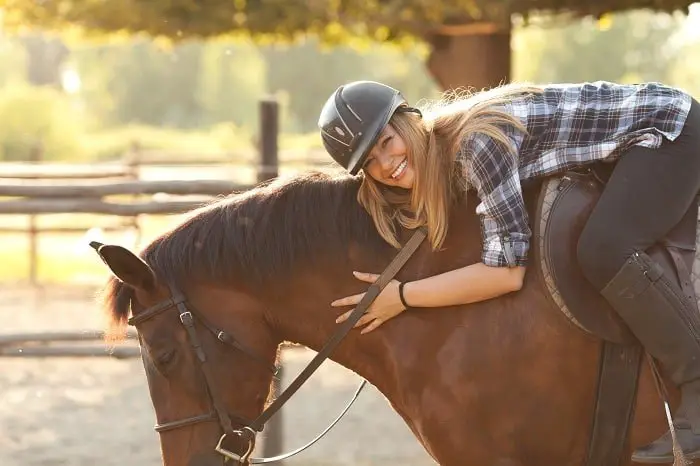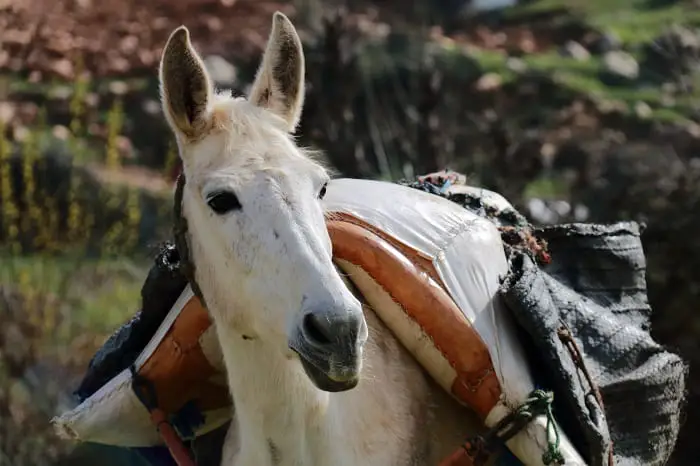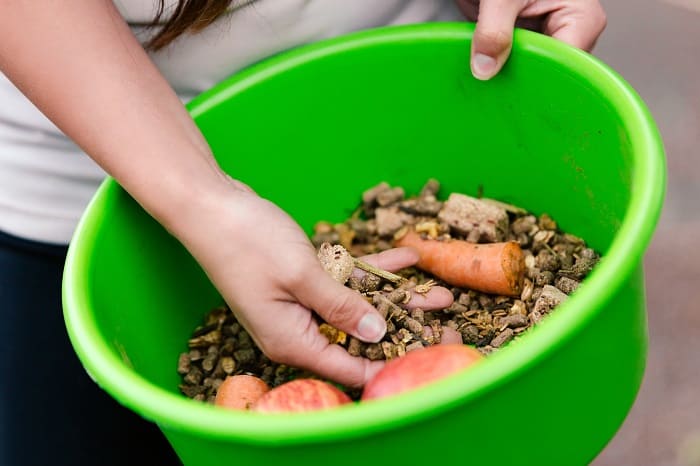Last Updated on January 28, 2023
Have you ever wondered how old can a horse live? You’ll be amazed when you find out just how long the lifespan of a horse really is! While the approximate lifespan of horse species can vary considerably, there are some horses out there that have lived to a very impressive age. Let’s find out everything you need to know about how old can a horse live!
How Old Can a Horse Live?
Horses’ lifespans vary greatly and are dependent on many different factors. From ponies to drafts, racehorses to endurance athletes, different horses have characteristics that impact their longevity and lifespan.
As their caretakers, how we care for our horses also impacts the length of their lives. Sometimes horses are only with us for a few years and sometimes they are with us for a lifetime. Today we are going to take an in-depth look at how old can a horse live and factors that may contribute to equine longevity.
Average Lifespan Of a Horse
On average, horses live to be 25-30 years old. However, this is only the average, and there are many examples of horses that live to be older than 35, and others that will die before they are 25 years of age. Most horse enthusiasts will be able to tell you tales of horses that lived well into their 40s, as well as other horses that tragically did not make it into double digits.
The difference between these examples is normally due to the cause of the horse’s death. Horses are used for many different purposes and live very different lifestyles as a result of this. A child’s riding pony that lives out in a paddock has a far more natural lifestyle than a top-level equine athlete on an intense training schedule.
Although there are obviously exceptions, horses that have lived into their 40s will normally die of old age. Living to this age means the horse has been cared for extremely well, and they were unlikely to have any serious health issues. These horses will have been fully retired from all riding and work as they reached their geriatric years, and were kept healthy with feed supplements and wet feed for their aging teeth.
On the other hand, a horse that dies at a younger age is normally euthanized as a result of a serious injury or illness. This could be due to a musculoskeletal injury, such as a fractured bone, or a degenerative condition that leads to irreversible lameness. Or the horse may succumb to one of the diseases frequently suffered by domesticated horses, like severe colic or laminitis.
What Age Do Horses Die?
Sadly, not all horses get to enjoy their golden years and die far too soon. Horses can get sick, just like people can; horses can have cancer, and they can have blood diseases. They can also get into tragic and unpreventable accidents. Sometimes these accidents happen while the horse is being ridden, sometimes they happen out in the field. But, sickness and tragedy prevent some horses from living out their lives fully.
The average lifespan of a horse is of about 25-30 years. Many different factors and characteristics will determine a specific horse’s estimated lifespan, including breed, lifestyle, workload, feed, and genetics.
How Long Can a Horse Live: Breeds
When it comes to how long can a horse live, horses are somewhat similar to dogs; smaller breeds tend to live longer than the bigger ones. With dogs, breeds like terriers and chihuahuas tend to live longer than breeds such as Labradors or German Shepherds. With horses, pony breeds such as Shetlands and Welsh Ponies often have a longer lifespan than larger breeds such as Warmbloods and draft horses. Certain breeds tend to live longer than others.
Whilst the breed of horse is not the only factor that contributes to a horse’s lifespan, statistics do show that it definitely contributes. But, as always, there are exceptions to this rule. For example, two of the oldest horses recorded include Orchid, an Arabian cross who lived to be 50 years old, and Rosie, a donkey who lived to be 54 years old.
How Long Do Shire Horses Live?
Shire horses are one of the largest horse breeds you will come across. This draft breed of horse is one of the true giants of the equine world, with an average height of 16 to 18 hands high and a body weight of around 2,200 pounds.
Considering their large size, Shire horses have a remarkably long lifespan. There is little data available on the average lifespan for this breed, but most reputable sources state that it is between 25 and 30 years. It would be safe to assume that the vast majority of Shire horses reach the age of 20 and beyond.
So, if Shire horses are so large, why is their lifespan the same as smaller horse breeds? Well, the reason for this could be that they are less predisposed to injuries and illnesses than other horse breeds. They have a strong musculoskeletal system and effective metabolism which helps to keep them fit and healthy into their old age.
In modern times, Shire horses are also far less likely to be required to carry out strenuous work. In the past, these huge draft horses would work long days in the field pulling plows, and would often be required to haul heavy loads along rough, rutted tracks. In comparison, the modern-day Shire horse has a life of leisure, with most only used for displays and exhibitions.
How Long Do Ponies Live?
So, we go from the giant Shire horse to the other end of the spectrum – small but adorable ponies! But how long do ponies live on average?
The lifespan of a pony will vary according to the breed, but they tend to live longer than horses. One of the most well-known examples is the hardy Shetland pony, which has an average lifespan of 30 to 35 years. Other pony breeds with a long lifespan include the Welsh Mountain pony, Haflinger, and Exmoor pony.
The reason that ponies tend to live for longer than horses is that they are lighter in weight, resulting in less wear and tear to the musculoskeletal system. One of the most common problems in horses as they grow older is lameness, whereas ponies rarely suffer from this issue.
Can You Make a Horse Live For Longer?
Just as in humans, many external factors affect how old can a horse live. Some of these factors are outside of our control, but others are due to the way we care for and use our horses. As horse owners, we can pay heed to these external factors, helping to ensure that our equine partners are happy and healthy for as long as possible.
Lifestyle & Living Conditions
One of the most important factors which affect the lifespan of a horse is the way it is cared for and housed. This is an extremely broad category, and will vary depending on the discipline a horse is involved in, the conditions it lives in, and many other factors.
The reason why the way a horse is cared for may affect its lifespan is due to the lifestyle conditions we have imposed on our domesticated horses. You may feel happy knowing that your horse is in a warm, dry stable with a belly full of grain, but is this the best thing for your horse? Probably not!
Just like in humans, a sedentary lifestyle with easy access to high-calorie foods is not good for your horse’s health. Horses have evolved over thousands of years to survive in harsh weather conditions, scavenging for food on rough grazing. When we put them in warm accommodation and give them an all-you-can-eat buffet, we are putting them at risk of many health problems! Obesity is rapidly becoming one of the main causes of health problems in horses and can lead to life-long health problems.
So, unless your horse is an elite athlete at peak fitness, it pays to keep its lifestyle as natural as possible. Time spent out at pasture means the horse must move constantly in search of food, keeping the musculoskeletal system and gastrointestinal tract healthy and functioning normally. The gradual intake of food is also ideal to keep the metabolic system in peak condition, as well as ensure the teeth of the horse wear down evenly.
Just because your horse should be turned out as much as possible doesn’t mean you should neglect other aspects of its care! Every horse should receive regular vet checkups, routine vaccinations, deworming, and routine foot trims. Grooming the horse every day will help to keep the skin and coat healthy, as well as allow you to bond with your horse and check it carefully for injuries.
Stress can also be very detrimental to the lifespan of a horse, so your management routine should ensure the horse is happy, relaxed, and enjoys his life. For example, the vast majority of horses enjoy the company of other horses, so should not be kept alone. Certain situations can be very stressful for horses, such as traveling and competing, so you may wish to consider using stress-relieving supplements to ensure your horse stays calm and relaxed.
Workload
The amount of work a horse carries out can also affect to its lifespan. This includes not only how much work it carries out, but also the type and intensity of work.
Many factors must be considered when analyzing a horse’s workload, including:
- How old was the horse when it was broken to ride?
- How long has it been working in a certain equestrian discipline?
- What age was it when it was involved in that discipline?
- How frequently was it worked?
- Was it involved in competition and, if so, how rigorous and often did competitions occur?
With any horse, you must have a good idea of what the horse has done in the past, to help determine the best course of action for the horse’s future.
For example, many people opt to take on an off-the-track Thoroughbred to retrain as a riding or competition horse. Most racehorses are backed and raced from a young age, sometimes even as a two-year-old. At this age, the musculoskeletal system of the horse is not yet fully developed, and this can lead to problems later in life.
Some horses may have had a previous career as an eventer or showjumper, which can lead to wear and tear of the joints in the legs. It may be that these horses have reached the end of their career as jumping horses, but can carry on light-ridden work for many years to come.
Being proactive about understanding your horse’s past workloads and careers can help you best prepare for his future well-being. Taking precautions and gaining knowledge can help prevent unnecessary injuries that could impact a horse’s lifespan.
Genetics
Genetics is an external factor, but not one that we can do much about unless you are a horse breeder. Similar to people, certain equine diseases and conditions are hereditary, meaning that horses can inherit them from their parents or grandparents.
An example of this is hoof wall separation disease (HWSD). This disease is passed genetically from parents to foals and can cause severe deterioration of a horse’s hooves. All the hoof-strengthening pastes and supplements in the world cannot prevent a horse from having this disease.
But, understanding your horse’s genetic history can help you prepare for situations like this. For example, sometimes HWSD doesn’t impact a horse until later in life. So, an understanding that a horse may have a limited career and may need to be retired once the condition is in full force can help the owner best care for the horse through all stages of life.
Nutrition
A horse’s diet has a huge impact on its longevity, and, thankfully, it is something that we can have a positive effect on. A healthy diet is one of the key factors to a healthy, happy horse. Ensuring that your horse has access to the right kinds of foods in the right amounts can significantly impact your horse’s lifespan.
Let’s start with “the right kinds of foods” – this is going to vary from horse to horse. Different feeds have different impacts on horses; some feeds are meant to help horses gain weight, some to help horses lose weight, some to help prevent conditions such as ulcers or colic, and so on.
However, as a general rule, most horses are better off eating a diet that is high in forage such as hay and grass and low in cereal grains. This will be sufficient to meet the energy needs of a horse in low to moderate levels of work. Equine athletes at peak fitness require much more energy, and this can be provided by feeding grains and fats.
If your horse is a hard keeper or is prone to ulcers, catering to those needs with relevant feed types can help prevent unnecessary health issues and conditions that can, in turn, impact their lifespan.
Bodyweight
Both overweight and underweight horses can have health issues that adversely affect their lifespan. Keeping your horse at a healthy body weight by providing the proper amount of food can greatly increase his chances of a long happy life, especially when combined with regular daily exercise or time out on the grass.
Other additional elements to a horse’s diet that can be considered are supplements. Supplements typically go into a horse’s feed and can be compared to vitamins for people. We take vitamins to help with certain issues or symptoms we may experience day-to-day, and the same concept applies to a horse’s supplements.
Some supplements serve many different purposes in a horse’s life. For example, there are hoof supplements, joint supplements, ulcer-prevention supplements, coat health supplements, calming supplements, and many more. While there are no “lifespan supplements,” the supplements listed can positively contribute to a horse’s well-being. This, in turn, can positively affect lifespan and longevity.
Conclusion – How Old Can a Horse Live
So, as we have learned, on average a horse lives for 25-30 years. Many horses exceed this age range, but sadly some don’t make it anywhere near that long. The main factors that affect the lifespan of a horse are its breed, size, lifestyle, and genetic health conditions. Unless any health problems occur, you can expect your equine friend to be around for about a third of your lifetime.
As horse owners, the best thing we can do to ensure our horses live out all of their years happy and healthy is to keep watchful care of them and to stay informed about their lifestyles and past experiences. I hope this article helped you better understand the equine lifespan and how it could be relevant to you and your horse. If so, please share this article, and leave a comment below with your experiences!
FAQs
How Long Do Mini Horses Live?
A miniature horse's average lifespan is between 25 and 35 years. It has been known for some miniature horses to live until the age of 50! Miniature horses are generally very hardy for their small size and often live for up to a third longer than larger breeds.
How Long Do Quarter Horses Live?
An American Quarter Horse's average lifespan is between 25 and 35 years, but some can live even longer. As a result of medical advancements and veterinary care, many Quarter Horses live longer than the breed average.
Size, genetics, and how they have been cared for are all factors that impact the length of a horse's lifespan. A horse named Chief is the oldest Quarter Horse on record, turning 57 in 2017!
Do Horses Die of Old Age?
Old age can be a cause of death in senior horses but it is certainly not the most common. Unfortunately, many horses succumb to illness or injury long before they reach old age. Health, environment, breed, and other parts of their genetic makeup all play a part in the longevity of the horse.
Due to increasing knowledge about how to care for horses, senior horses are living to ages much higher than previously. For the horse owner, this brings about additional responsibilities to properly care for their older bodies that may not be able to consume and process foods as efficiently as they used to. With your veterinarian's suggestions, a nutritional plan can be created to suit your horse's needs and help them live a long and happy life.
Can Horses Sense Death?
Horse trainers and many other equine professionals agreed that horses recognize the smell of death.
Death also can have a huge impact on horses, the same as how people would feel. There have not been many studies done that pertain to loss or the grieving process in horses. Some say that a horse may show signs similar to separation anxiety like separating two horses that have spent a significant amount of time living together.
What Is The Number One Cause Of Death In Horses?
Studies have shown that diseases of the gastrointestinal system, such as colic, are the main cause of death in horses today. Other key causes of death in older horses include Cushing's disease, cancerous tumors, neurological disorders, lameness, and laminitis.
Michael Dehaan is a passionate horse owner, horse rider, and lover of all things equine. He has been around horses since he was a child, and has grown to become an expert in the field. He has owned and ridden a variety of horses of different breeds, and has trained many to compete in shows and competitions. He is an experienced horseman, having worked with and competed many horses, including his own. He is an active member of the equestrian community, participating in events and teaching riding lessons.



